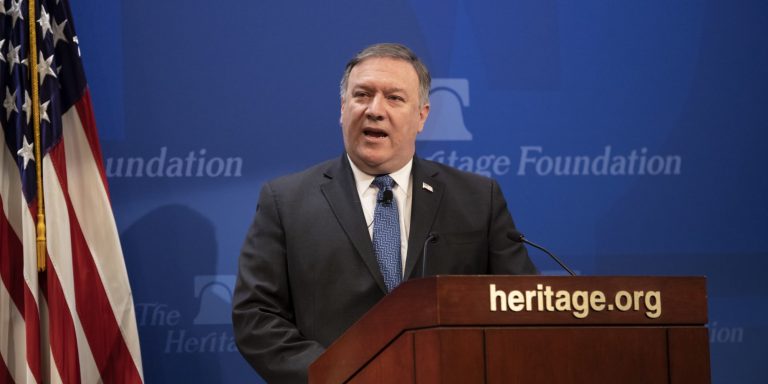INTELBRIEF
May 22, 2018
IntelBrief: Pompeo Unveils Iran Strategy

- Secretary of State Mike Pompeo used his first speech as Secretary to unveil the Administration’s hardline strategy on Iran, following the withdrawal from the Iran nuclear deal.
- Pompeo named specific demands for a reworked nuclear deal that go to the core of Iran’s ideology and which Tehran certainly cannot accept.
- The Pompeo speech downplayed the fact that Iran developed ballistic missiles and expanded its regional influence even when international sanctions were crippling Iran’s economy.
- The Secretary did not acknowledge European efforts to keep the existing nuclear deal in place by shielding their companies — and Iran — from re-imposed U.S. sanctions.
.
In a speech at the conservative Heritage Foundation on May 21, Secretary of State Mike Pompeo expanded on President Donald Trump’s May 8 announcement that the United States would withdraw from the landmark 2015 nuclear deal with Iran. Much of the speech was devoted to recounting the litany of objectionable Iranian behaviors that have been widely noted in briefings, congressional testimony, and statements since the administration took office. Secretary Pompeo attributed Iran’s policies, including its development of ballistic missiles and its intervention in numerous regional conflicts, to the additional financial resources provided to Iran by sanctions relief. Perhaps at risk of undermining his argument, the Secretary did not mention that these Iranian policies long predate the 2015 nuclear agreement and occurred even at the height of the impact of international sanctions during 2011-2015.
The Secretary articulated a hardline U.S. policy towards Iran that obliquely warned of military action should Iran restart banned aspects of its nuclear program and expressed U.S. support for anti-regime Iranian demonstrators. He also articulated numerous demands for Iran to meet in a reworked nuclear agreement—demands that go to the core of Iran’s revolutionary ideology and national security interests and which Iran’s leaders will therefore certainly reject. The demands included not only a total end of all nuclear activities in Iran, but also a halt to ballistic missile development, an end to Iranian support to Middle Eastern armed factions such as Hezbollah, Hamas, and Palestinian Islamic Jihad, and a complete withdrawal of Iranian forces from Syria. The Secretary stated that the United States would work with partners to “track down Iranian operatives and their Hezbollah proxies” and to “crush them.” Yet, the Secretary did not announce any new U.S. force deployments or regional initiatives that would presumably be needed to counter Iran’s regional malign activities. Nor did he answer the apparent contradictions between demanding Iran’s withdrawal from Syria and President Trump’s stated desire to soon withdraw the approximately 2,000 U.S. forces there. Attempting to demonstrate commitment to diplomacy with Iran, Secretary Pompeo held out hope that, if Iran fundamentally shifts course, the United States and Iran could re-establish ‘diplomatic and commercial relationships.’
Secretary Pompeo asserted that his recent discussions with European allies and other countries demonstrated to the administration that its concerns about Iranian behavior are widely shared. That assertion underpinned his belief that the re-imposition of U.S. sanctions would pressure Iran’s regime to choose to ‘either fight to keep its economy off life support at home or keep squandering precious wealth on fights abroad.’ Yet, whereas the Secretary referred to European opposition to the U.S. withdrawal, he skirted the fact that the European countries have begun to take concrete steps to shield their own companies – and the Iranian economy — from re-imposed U.S. secondary sanctions. These steps are central to Europe’s efforts to preserve the Iran deal, and the results of the European efforts could ultimately determine whether administration policy eventually produces active U.S. hostilities with Iran.
.
For tailored research and analysis, please contact: info@thesoufancenter.org
[video width="960" height="540" mp4="https://thesoufancenter.org/wp-content/uploads/2018/05/Final-Edit-1-199.mp4" poster="https://thesoufancenter.org/wp-content/uploads/2018/05/AP_18141494096959-1-e1526990104115.jpg"][/video]